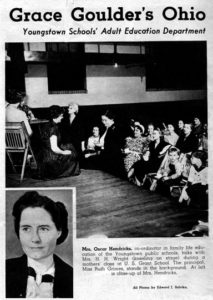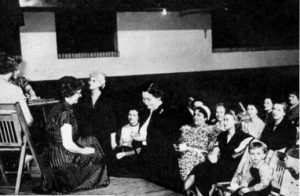
Youngstown Schools Adult Education Department Irons Out Household Problems, Particularly Budgets.
“Her young shoulders drooped dispiritedly, and her face had forgotten about smiling. She sought out Mrs. Oscar Hendricks of the adult education department of Youngstown’s public schools, whose official title is coordinator in family life education. It is a good title. Mrs. Hendricks, better known as Gertrude, or “Peg” lives up to it.
Mrs. Hendricks’ caller was the mother of two children, she said. Her husband, a steel worker, isn’t making enough to support us. I need to earn some money, and I thought maybe you could help me find a job.”
Mrs. Hendricks went into action, not by hunting up work for her caller, but by taking about the family budget. Except that this family didn’t have a budget. Which was the core of the problem. Incoming money was sufficient, Counselor Hendricks pointed out. It was the outgoing money that was making the trouble.
The woman was sent home, and asked to return with data as to the exact amount paid out for rent, food, clothing, public utilities – and the bills. She was to bring a big sheet of paper that could take all the items. The next day she appeared with a wad of bills, and a roll of shelf paper!
All that was four years ago. The family is out of the dilapidated rented place where they used to live, and in a neat house they are buying. They have a savings account and some government bonds. Best of all, the marriage, which was rocking threateningly in a storm of money confusion, is serene and the wife-mother is using her smile crinkles again. She is the leader of a group of other wives and mothers who gather in the school in her neighborhood. Under Mrs. Hendricks’ guidance all are studying family money management.
Other women are meeting in many parts of Youngstown, in schools, church parlors and headquarters of women’s clubs. Wherever a natural meeting place develops, there Mrs. Hendricks carries her gospel. It includes such subjects as parent training; child study; play schools; sex education, which she prefers to call “physical and mental growth”; marriage ideals; how to be happy after 40; planning by the engaged couple; the role of grandmother and mother-in-law. Last year the total attendance for her “classes” was nearly 7,000.
At U.S. Grant public school I visited a session of 40 mothers studying home management and child development. Discussions touched on giving children a great deal of affection; allowing for a lot of enjoying by both parents and children instead of making every home incident a do-or-die issue; seeing to it that the home offers the particular security each member needs. Mrs. Hendricks believes in plenty of discipline, I gathered. But it should come “from inside the child, with the child feeling right about it,”
The session finished with a pleasant interlude for coffee and visiting. The women, most of them wives of steel workers, said these meetings helped them realize their home problems were not unique or abnormal; that they acquire many ideas from the mutual sharing. They enjoy this opportunity to become acquainted with their neighbors and with the parents of their children’s schoolmates.
They were a well-groomed, alert lot, largely with European backgrounds, and among them several colored women, all getting along in the friendliness that is the American way. Miss Ruth Grimes, school principal, commented that since the start of these mothers’ classes school tensions have lessened and teachers are backed more understandingly by parents.
Next, I went to a play school, conducted in the parlors of the First Christian Church. Begun several years ago as a baby-sitting arrangement among mothers, it has developed into two big schools for very young and not so young children. Mothers serve for scheduled periods as teachers, following training and regular refresher courses. Expenses are met through contributions of participating mothers, with no set fee required.
“We learn a great deal from these play school doings that we carry out at home, “one mother told me.
Another said: “I get a perspective on my own children from noting other children’s reaction to me when I take my turn as teacher. Settling quarrels here gives me an insight in calming my children’s squabbles at home.”
Mrs. Hendricks elaborated: “This is one of several play schools that the Board of Education supervises around the city. We think of them as practical laboratories where mothers can learn good principles of child rearing while doing and working with their own and other children. And of course the child grasps at an early age the technique of getting along with contemporaries so that his adjustment to formal schooling later is a painless one.”
One of the mothers-teachers is Mrs. Yanghu Tong, native of China, and a graduate of Columbia University. Her husband is an engineer in a Youngstown plant, and his father, Hollington Tong, also a graduate of an American college, is Nationalist China’s ambassador to Japan. The Yanghu Tongs’ little girl, Vivian, is enrolled in the playschool.

Friendly, easy to talk to, with a brisk enthusiasm for life, Mrs. Hendricks is no mere text book theorist. Her teachings are distillations of her own experiences. Widowed when her two sons, William and Robert, were babies, she has combined a career with rearing her children and home-keeping. Her sons went on to attend her alma mater, Ohio State University, and both became quite accomplished.
“We managed, I guess, because we had a system. Each of us carried a share of the household chores, the boys’ responsibilities increasing as they grew older. And we have a lot of fun together.” she added. She works not only through the Youngstown public school adult education division of which Assistant Supt. J. Fred Essig is head, but also in cooperation with the federal and state Boards of Education. The Ohio part of her program is under Miss Enid Lunn, director of Vocational Home Economics, Columbus. Other similar family life programs are going forward under Miss Lunn in Toledo, Zanesville, Cincinnati, and Cleveland. The Cleveland program is directed by my friend Mrs. Roxanna Brannon, who lives in Hudson.